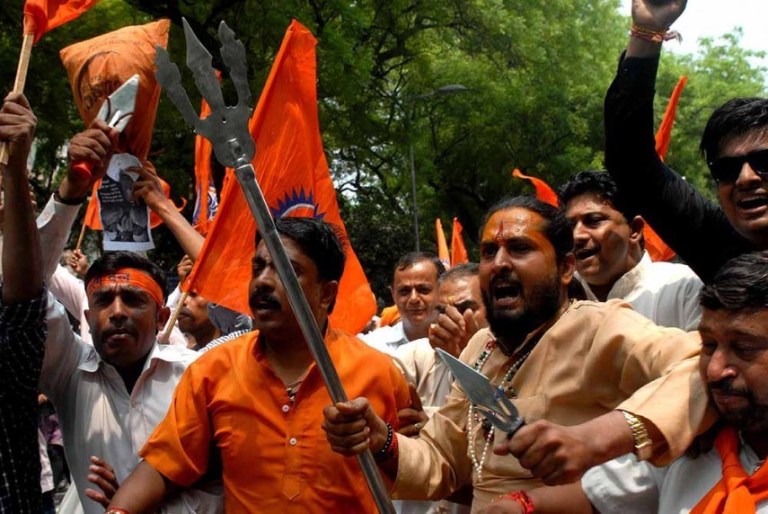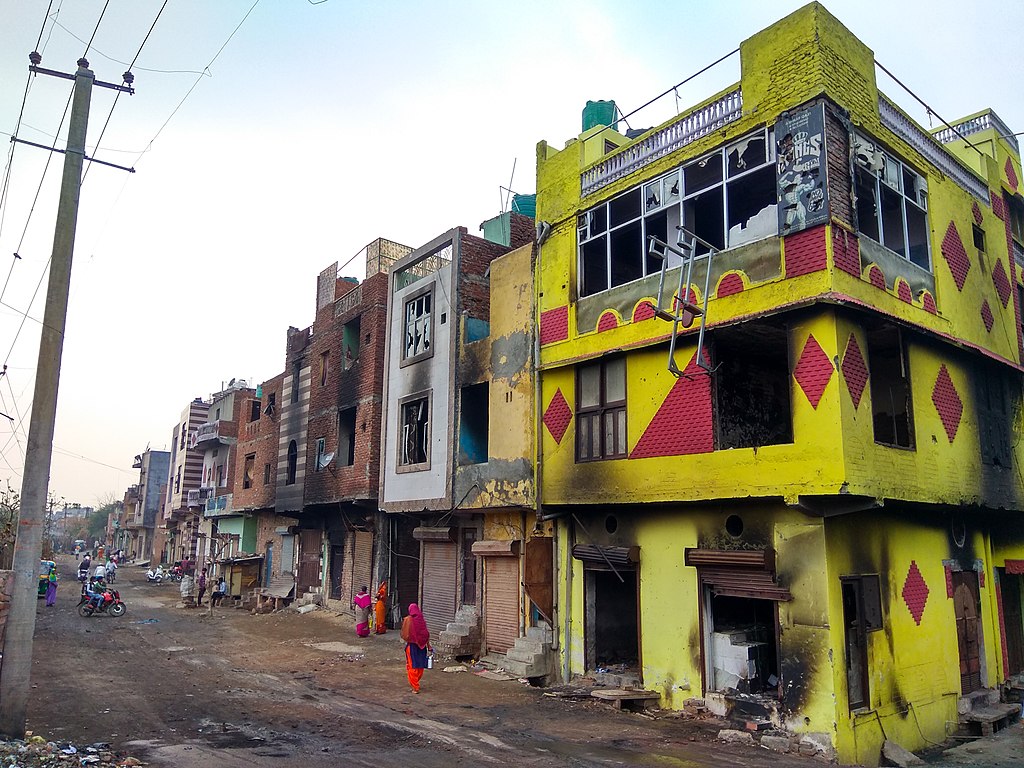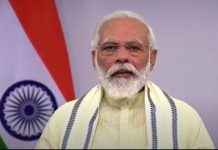These days I feel I am becoming increasingly anxiety-ridden. And this anxiety, I guess, is existential as well as political. There are moments when I experience the burden of guilt; and I fear that as a ‘Hindu’, it is really difficult for me to face my ‘Muslim’ friends and students. In fact, the other day a ‘Muslim’ student came of my office. I saw tears in her eyes. And then she told me: ‘Our psychic trauma nobody would understand, Sir. We are suffering. We are struggling. And everything seems to be normal for the rest’. Yes, she became my mirror. I could not escape myself. As part of the majority ‘Hindu’ community, do I really understand what it means to be a ‘Muslim’ in our times when triumphant Hindutva is never tired of stigmatizing and humiliating the minorities? This question continues to haunt me. Again, the Delhi massacre—a logical consequence of the culture of hatred implicit in the practice of hyper-masculine ‘Hindu nationalism’—makes me ask a disturbing question. Is it that our secularism is terribly fragile, and we have not yet been able to bring it closer to people’s consciousness? Is it merely an intellectual discourse confined to the liberal-left cultural elite?
Empathy and a transcendental self
To begin with, it is possible to say that I am a ‘Hindu’. Well, I carry a ‘Hindu’ name; and possibly, I am relatively more familiar with ‘Hindu’ epics, mythologies and cultural symbolism. Moreover, it would not be wrong to say that like all other religious traditions, ‘Hinduism’ too has its revealing insights into the riddle of existence. Hence, I need not hide my ‘Hindu’ self. But then, I am not merely a ‘Hindu’; my transcendental self seeks to cross all boundaries, and enables me to realize our shared humanity. Possibly, it is not impossible for me, despite my ascriptive ‘Hindu’ identity, to experience what unites all of us—say, the urge to be loved and acknowledged as a being with a soul; the pain of losing the loved ones; or the quest for fulfilling vocations, enabling material conditions, health, aesthetics, peaceful living and ecstasy of relationships.. Hence, I tell myself that I am not finished. I am not bounded. Despite being a ‘Hindu’, I can sharpen my empathy, and understand what my ‘Muslim’ friends and students are experiencing in this age of darkness.
Well, it may be said that there are limits to my ‘empathy’. After all, being part of the ‘majority community’, I am ‘privileged’. I cannot experience the intensity of pain and trauma that the minorities are experiencing. True, the Delhi massacre has not affected me; my property has not been destroyed; my grandfather has not been burnt alive. Yes, I see a point in my ‘Muslim’ student’s anguish, her psychic wound and loneliness. Yet, I can engage in a therapeutic act of collective healing. I can break the coldness of indifference, try to expand my horizon, feel what exists beyond the walls of separation, and transform the struggle of the ‘Muslims’ for inclusive and secular India into a collective struggle. Otherwise, I would prove the bunch of militant ‘Hindu nationalists’ and zealots right; and I would allow myself to fall into the trap of the constructed ‘Hindu’ vs. ‘Muslim’ binary.
Is it the time to wake up?
Secularism—beyond dry intellectualism

As Hindutva—a hyper-masculine discourse of militant nationalism—invades the politico-cultural landscape, a question haunts me. Why is it that our secularism has failed so miserably? Well, secularism may have multiple meanings. For instance, it is possible to say that atheism is the fundamental prerequisite for one to be secular. In other words, secularism, it would be said, is invariably related to a historical process that characterizes modernity—say, scientism, empiricism, rationalization and growing skepticism towards orthodoxies implicit in ‘organized religions’ (never forget that these ‘organized religions have often proved to be regressive, patriarchal and terribly afraid of innovative experiments with life and culture). And again, there are others who may argue that it is possible to be deeply spiritual, and yet secular. The spirituality or the religiosity of existence, it would be said, does not mean the acceptance of the priest craft, or associated orthodoxies; instead, it is about love and fusion of horizons. It is against all sorts of fundamentalism or totalitarianism. We see this spirit in the likes of Kabir, Nanak and Nizamuddian Auliya. What is interesting is that there is something common in both these notions of secularism, be it logico-rational or musically spiritual. It is primarily about non-discrimination; it is the liberating urge to see a person beyond all limiting identities; it is a project for a shared public domain: a striving for collective welfare.
But then, why did we fail? Yes, Gandhi with his elastic religiosity of love and compassion sought to nurture the ethos of secularism characterized by cross-religious dialogue, nonviolence and satyagraha. Possibly, he aroused the dream of secular India, even after the ugly divisive/communal politics that led to the trauma of Partition. He was an extraordinary communicator. He could play with religious metaphors for radical social reconstruction. However, the irony of history was that postcolonial India (disturbed by the psychology of anger and revenge) could not bear the Gandhian conscience. He was killed by a Hindu fanatic. Well, Nehru too was secular. But then, his secularism, despite its noble aspirations and visibly anti-communal orientation, remained confined to the liberal/left intelligentsia—the ideologues of ‘scientific temper’. It could not touch people’s souls in a country where religiosity matters; possibly; it looked somewhat ‘alien’; its intellectualism further widened the gap between the English-speaking metropolitan intellectuals and vernacular traditions. The sad story is that this intelligentsia was not even sufficiently equipped to deal with the religious question properly. No wonder, even a radical monk like Swami Vivekananda was allowed to be hijacked by the proponents Hindutva.
And then, after the Nehruvian era, our mainstream politics began to lose all grand ideals, or the spirit of the freedom struggle. Politics became merely instrumental—a clever strategy for winning the elections at any cost. Politics lost its pedagogy: its liberating education. Instead, the arousal of people’s gross emotions centred on caste, creed, and religion became the primary objective. In our times, the sangh parivar has expertized in these techniques of divisive and destructive politics. And these days the propaganda machinery cultivated by the ruling regime legitimizes these techniques of violence, surveillance and hate speeches. But then, even the ‘opposition’ parties are not lagging behind. For them, secularism, it seems, is nothing but a balancing act—visiting the temple; and at the same time, aligning with the patriarchal ‘Muslim’ clergy for reducing the entire community into a vote bank. Or, secularism becomes merely ornamental—a dramaturgical performance by the political class for celebrating the Iftar party in front of the television camera.
It is not surprising that our secularism has failed. Is it that we are destined to feel ‘secularism’ only in the imageries of Bollywood: the tales of Amar, Akbar and Anthony? Yet, we cannot afford to give up our quest. We have to rise up. With cultural syncretism, religious pluralism, authentic communication that breaks all sorts of ghettoization, and a collective struggle for some sort of socialist welfare we have to move forward, and overcome the prevailing darkness.
Are we ready for this psychic/spiritual and politico-cultural healing?
Avijit Pathak is a Professor of Sociology at JNU, New Delhi.









